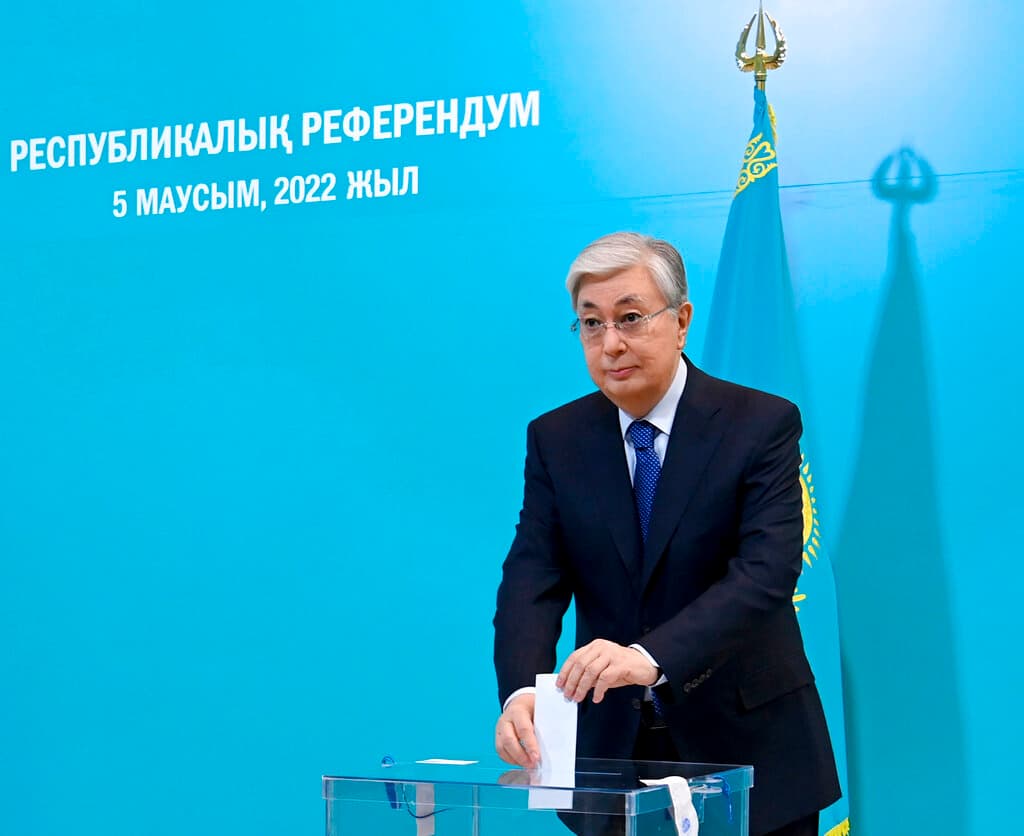Could Kremlin Pressure on Kazakhstan Lead to Hostilities?
Whether anti-Russian activity is transpiring in Kazakhstan is perhaps less relevant than the Russian pronouncement that there is.

Quietly but consistently, the Kremlin is exerting pressure on Kazakhstan in a way that, in the wake of the invasion of Ukraine, could foreshadow trouble for the world’s largest landlocked country. In particular, Vladimir Putin’s displeasure with certain less than adulatory attitudes from the Kazakh capital, Nur-Sultan, has been a feature of relations between Russia and the former Soviet republic for years and has lately intensified.
The latest verbal sparks flew last week at Minsk, where at a meeting of former Soviet Union public prosecutors Russia’s current prosecutor general, Igor Krasnov, said, “I am regularly informed that with the support of Ukrainian non-governmental organizations, active Russophobic activity is also unfolding in Kazakhstan.”
Furthermore, Mr. Krasnov said that “under these conditions, it is more important than ever to combat such challenges.” The remarks were reported in open-source regional websites such as Silkway News and also this week in London’s Telegraph newspaper. Whether anti-Russian activity is transpiring in Kazakhstan is perhaps less relevant than the pronouncement itself, and the choice of the word “combat” in connection with the perceived threat is not the language of reassurance.
Earlier this month the current Kazakh president, Kassym-Jomart Tokayev, attended an economic forum at St. Petersburg at which the Russian president was also present. In remarks from June 17 that raised a few eyebrows internationally, Mr. Tokayev challenged Mr. Putin on recognizing the self-proclaimed independence of the Russian-backed breakaway regions of Luhansk and Donetsk in eastern Ukraine, saying that “if all nations in the world use their right to self-determination, there will be over 500 or 600 states instead of 193 that are members of the UN today,” and “that would be chaos.”
He added: “And for that reason, we do not recognize Taiwan, Kosovo, South Ossetia, and Abkhazia. And this principle will be used towards the quasi-state territories such as Luhansk and Donetsk, as we believe them to be.”
That reportedly soon prompted a sardonic remark from the Russian president that appears to have been scrubbed from the Kremlin’s official transcript of the exchange, but another was left intact. In response to the Kazakh president’s observation that “Donetsk is being pounded every day,” Mr. Putin said that “the individuals who deserve actions of that level coming their way from us should realize what they may be facing” should they “cross these [red] lines.”
Kazakhstan has a sizable ethnic Russian population, particularly in the north of the country near the long border with Russia. Against the backdrop of the war in Ukraine, Mr. Tokayev also said at the St. Petersburg forum that “some people are saying that they are ashamed of being Russian,” to which Mr. Putin replied: “You know who should be ashamed? The people who do not tie their fate and their lives, the fate of their children, with our country.”
Mr. Putin, of course, sent an invasion force across the Ukrainian border in February in large part on the spurious claim that ethnic Russians were suffering mistreatment in Ukraine. Being the kind of leader with a demonstrable proclivity for backing up his bark with a bite, the day after the St. Petersburg sparring a shipment of Kazakh oil through the Russian port in Novorossiysk was mysteriously suspended. In response, Kazakhstan reportedly blocked 1,700 Russian coal wagons on its territory for an indeterminate amount of time.
As the Sun has reported, Mr. Putin’s vision of neighborly relations is not always especially cordial. In 2014, as violence escalated in eastern Ukraine, Mr. Putin told the first Kazakh president, Nursultan Nazarbayev, that he had “created a state on territory where no state had ever existed.”
What this augurs for Russian-Kazakh relations remains to be seen. In an interview with Azattyk, the Kazakh edition of Radio Free Europe/Radio Liberty, a professor at the National Defense University in Washington, Erica Marat, said he thinks “verbal violence will continue, an attempt to humiliate [from] various sources of Kremlin propaganda: United Russia members, politicians and media personalities.”
That kind of media intimidation has been occurring for months now. In April, a celebrity Russian television host, Tigran Keosayan, addressed his “Kazakh brothers” via his YouTube channel, saying: “Look at Ukraine carefully, think seriously. Because, my dears, if you think that you can continue to be so cunning … and you will not get anything for it, you are mistaken.” Mr. Keosayan, as the Sun reported, has been sanctioned by the EU for using his state-funded TV show to claim that the Ukrainian government was unlawful and for espousing anti-Ukraine propaganda.
Under the current highly volatile circumstances, a spillover of the hostilities in Ukraine into points in central Asia could foreseeably transcend the media space. According to some sources in Kyiv, Mr. Putin once asked Kazakhstan to join the Russian occupation forces in Ukraine, but Kazakhstan refused. True or not, the cooling relations between the neighbors could presage friction.
Only about 450 miles separate easternmost Ukraine from westernmost Kazakhstan. Between the two sits the large and heavily symbolic city of Volgograd, which is no stranger to unstable times: formerly Stalingrad, it is where one of history’s biggest battles was fought, one that proved a major turning point in World War II.

